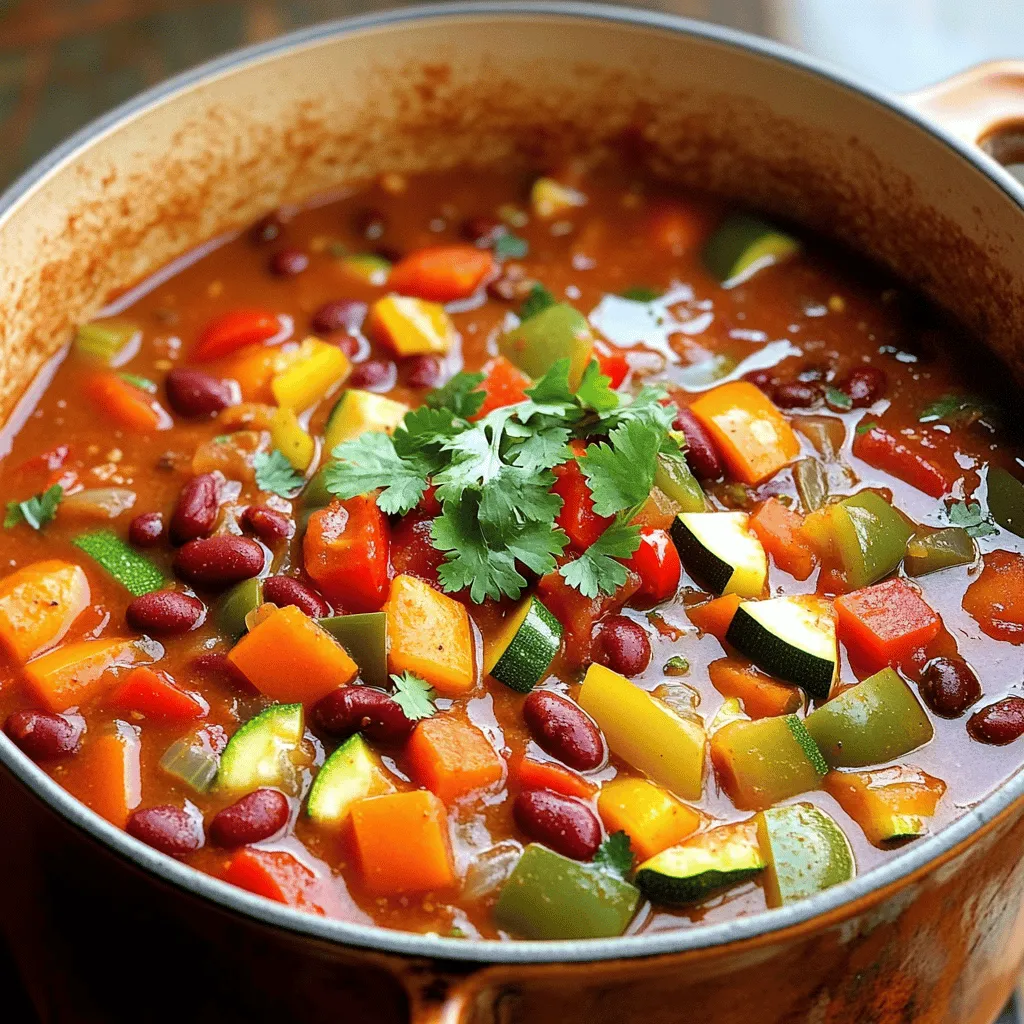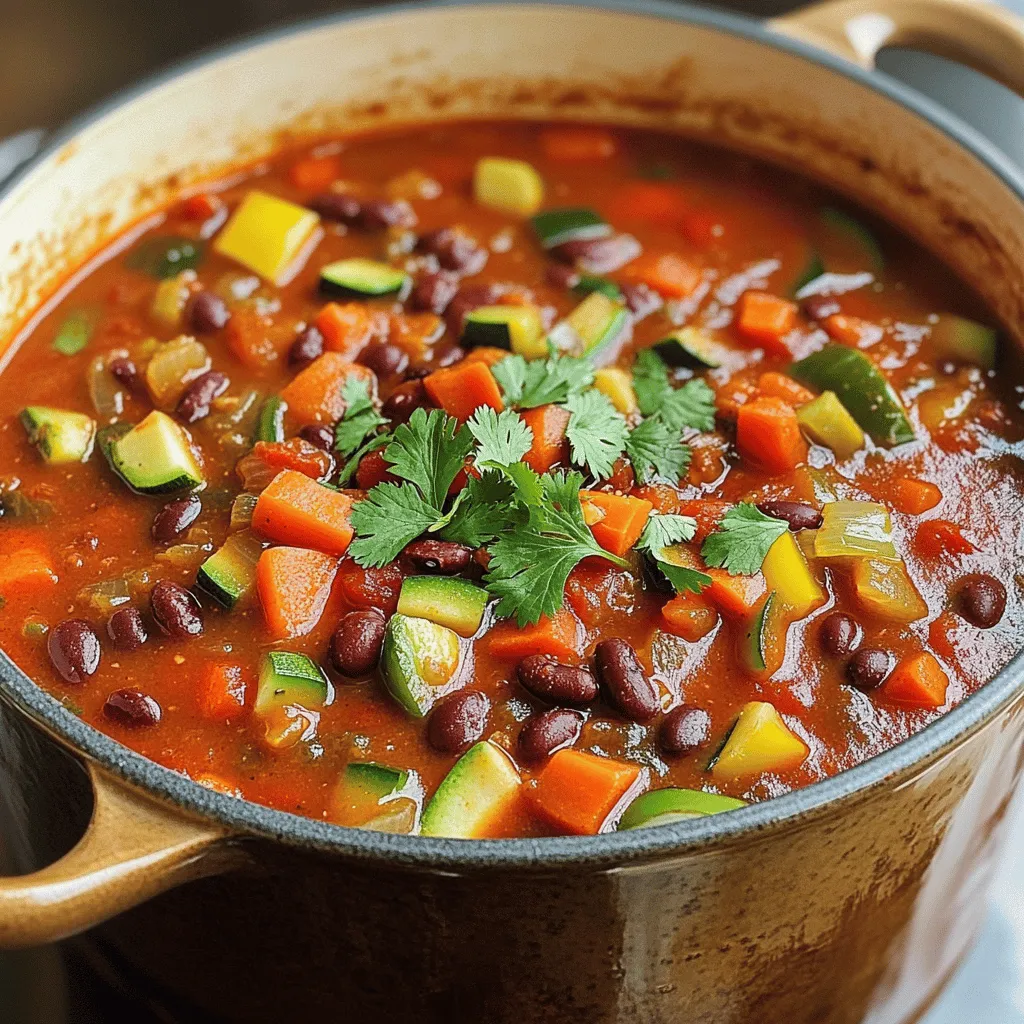If you’re hunting for a warm, comfy meal that’s packed with flavor and good-for-you veggies, look no further! My Veggie-Packed Chili recipe is a delicious way to enjoy plant-based goodness. With fresh vegetables, hearty beans, and spices that awaken your taste buds, this dish is both satisfying and nourishing. Get ready to whip up a big pot of this easy chili that will please everyone at your table!
Ingredients
Essential Ingredients for Veggie-Packed Chili
To make a great veggie-packed chili, you need a few key items:
– 2 tablespoons olive oil
– 1 large onion, chopped
– 3 cloves garlic, minced
– 1 bell pepper (red or green), diced
– 2 carrots, diced
– 1 zucchini, diced
– 1 cup mushrooms, chopped
– 1 can (15 oz) kidney beans, drained and rinsed
– 1 can (15 oz) black beans, drained and rinsed
– 1 can (15 oz) diced tomatoes (with juices)
– 1 cup vegetable broth
These fresh vegetables bring bright colors and flavors to the dish. The beans add protein and make the chili filling. Diced tomatoes give it a rich texture and a hint of sweetness.
Spices and Seasonings
The spices make your chili sing! You will need:
– 2 tablespoons chili powder
– 1 teaspoon cumin
– 1 teaspoon smoked paprika
– Salt and pepper to taste
Chili powder is the star here. It gives heat and flavor. Cumin adds earthiness, while smoked paprika gives a nice smoky touch. Don’t forget to adjust the salt and pepper to your taste!
Optional Garnish
For a pop of freshness, try this garnish:
– Fresh cilantro
Cilantro adds a bright finish to your chili. If you love it, sprinkle some on top before serving.
Step-by-Step Instructions
Preparation Steps
1. Heat 2 tablespoons of olive oil in a large pot over medium heat.
2. Add 1 large chopped onion. Sauté for about 5 minutes until it turns clear.
3. Stir in 3 minced garlic cloves, 1 diced bell pepper, and 2 diced carrots. Cook for another 3-4 minutes. The veggies should start to soften.
4. Next, add 1 diced zucchini and 1 cup of chopped mushrooms. Sauté for another 5 minutes. Stir occasionally to avoid burning.
5. Now, stir in the beans and broth. Add 1 can of drained kidney beans, 1 can of drained black beans, 1 can of diced tomatoes, and 1 cup of vegetable broth.
Cooking Process
1. Season the chili. Add 2 tablespoons of chili powder, 1 teaspoon of cumin, 1 teaspoon of smoked paprika, salt, and pepper. Mix all ingredients well.
2. Bring the mixture to a boil. Once boiling, lower the heat. Let it simmer uncovered for about 25-30 minutes. Stir occasionally to keep it from sticking.
3. Taste the chili. Adjust the seasoning if needed. If you want a thicker chili, let it simmer longer.
Serving Recommendations
1. Serve the chili hot. Garnish with fresh cilantro if you like. This adds a nice touch.
2. Pair your chili with sides. Cornbread or rice work great. You can also serve it with tortilla chips for crunch.Enjoy your cooking!
Tips & Tricks
Perfecting Your Veggie-Packed Chili
To achieve the best flavor, use fresh ingredients. Fresh veggies give your chili a lively taste. Sauté your onions and garlic first. This step builds a strong flavor base. Mix in your bell pepper and carrots next. Let them soften to enhance their sweetness.
For a thicker chili, let it simmer longer. The longer it cooks, the more the flavors blend. If you want even more thickness, mash some beans against the pot. This adds creaminess without extra calories.
Cooking Techniques
I recommend using a heavy-bottomed pot. A cast-iron or a Dutch oven works great. These pots heat evenly. They help prevent hot spots that can burn your chili.
If you like your chili a bit saucier, adjust the cooking time. A shorter cook time keeps it brothier. For a denser chili, let it simmer longer. Just keep an eye on it, so it doesn’t stick.
Health Benefits
Using a variety of vegetables boosts nutrition. Each veggie adds unique vitamins and minerals. For instance, bell peppers are rich in vitamin C. Zucchini is low in calories and high in fiber.
Plant-based meals like this chili can improve health. They may lower the risk of chronic diseases. Eating more plants can help you feel full and satisfied. Plus, it’s good for the planet, too!

Variations
Protein Additions
You can switch up the protein in your chili. Try using other beans like pinto, navy, or chickpeas. Each of these adds a unique taste and texture. If you want something different, add tofu or tempeh. Both options soak up flavors well. Cube them and add them when you mix in the beans. This gives your chili a nice boost in protein.
Spice Level Adjustments
You can easily adjust the spice level. If you like it hot, add more chili powder or diced jalapeños. For a milder taste, reduce the chili powder and skip the jalapeños. You can also try other spices like cayenne or chipotle powder. These spices add rich flavors without making it too hot.
Other Vegetable Choices
Adding roasted veggies can enhance the taste. Consider adding roasted sweet potatoes, butternut squash, or bell peppers. They bring a nice sweetness and depth. You can also substitute seasonal vegetables for freshness. In summer, add fresh corn or zucchini. In fall, try pumpkin or squash. This keeps your chili vibrant and full of flavor.
Storage Info
How to Store Leftovers
To keep your veggie-packed chili fresh, let it cool first. Once cool, store it in a clean container. Use an airtight container to keep out air and moisture. This helps prevent spoilage. You can keep it in the fridge for up to five days. Label the container with the date to track freshness.
Reheating Guidelines
When you’re ready to enjoy your leftovers, reheating is key. Use a microwave or a pot on the stove. If using a microwave, heat in short bursts. Stir well in between to avoid hot spots. If using a pot, heat on low and stir often. To boost flavor, add a pinch of chili powder or some fresh herbs. This will bring the chili back to life.
Freezing Veggie-Packed Chili
Freezing is a great way to save chili for later. First, let it cool completely. Then, pour it into a freezer-safe container or bag. Remove as much air as possible before sealing. Label it with the date. You can freeze it for up to three months. When you’re ready to eat it, thaw it overnight in the fridge. Reheat it on the stove or in the microwave for the best taste.
FAQs
Can I make this chili ahead of time?
Yes, you can make this chili ahead of time. It actually tastes better after a day in the fridge. To meal prep, cook the chili fully, then let it cool. Store it in an airtight container. Reheat it when you are ready to eat. You can also make it in larger batches. This way, you have quick meals ready for busy days.
What can I use instead of vegetable broth?
If you don’t have vegetable broth, try using water. You can also use mushroom broth for a richer flavor. Another option is to mix water with soy sauce or miso paste. This adds depth and umami to the chili. Each liquid will change the taste slightly, but they will still work well.
How long does veggie chili last in the fridge?
Veggie chili lasts about 4 to 5 days in the fridge. Make sure to store it in a sealed container. Always check for any signs of spoilage before eating. If you want it to last longer, consider freezing it. Properly frozen chili can last for up to 3 months.
This blog post covers everything you need for a tasty veggie-packed chili. We discussed key ingredients like fresh vegetables, beans, and spices. I shared step-by-step instructions for cooking and tips for the best flavor. You learned about variations, storage, and reheating for leftovers.
In the end, this chili is more than just a meal. It’s a way to enjoy health, flavor, and creativity. Try different ingredients and make it your own. Enjoy each bowl filled with goodness!




